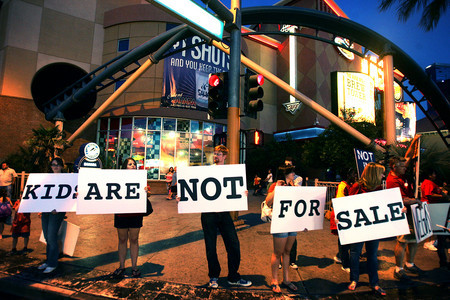Rally targets child prostitution

Tina Frundt was 13 when it began. The man smiled. He said nice things to her. He pretended to help her.
"He was a pimp," Frundt, now 35, said Friday night. "I didn’t know what a pimp was. He didn’t walk up and say, ‘Hi. I’m a pimp.’"
So began a decade of hell for the Chicago native. She was raped, beaten, forced into the sex industry, sold and traded like a used car to an out-of-state outfit so she couldn’t run back home.
This happens every day. Here, in Las Vegas.
So went the message at a rally and march that began in a gymnasium on East Sahara Avenue across from the Commercial Center and continued later to the Strip.
Shared Hope International, a Virginia-based nonprofit working to prevent sex trafficking and provide support for boys and girls in the industry, organized the rally and march as part of its launch of a national campaign to draw attention to the issue.
The group released reports in 2008 and in May listing Las Vegas as one of the country’s major hubs for the sexual trafficking of children and saying the city doesn’t have enough services to help them.
The reports focused on American children who have been trafficked within the United States.
Robin Joyce, the pastor at Canyon Ridge Christian Church in Las Vegas, told a crowd of a little more than 100 people that the trafficking of girls for sexual slavery is evil, pure and simple. The rally, he said, would be "the catalyst to destroy the stronghold that Satan has on this town."
Children from across the country are trafficked to cities including Las Vegas, where more than 400 prostituted children were identified on the streets during a single month in 2007, according to the nonprofit’s reports.
"Any place where there’s a lot of sexuality marketed, you’re going to be a hub," said Linda Smith, president and founder of Shared Hope International and a former Washington congresswoman. "If there’s a buyer, there has to be a product."
Pimps traffic teenage prostitutes through a network of cities known to attract tourists, conventions and people interested in sex industry services, Smith said. She listed Washington, D.C., Los Angeles, New Orleans, Dallas, and Atlanta as cities in that network, along with Las Vegas.
"A pimp will say you can always raise money in Las Vegas," Smith said. "It isn’t hard to make a phone call, meet somebody and get a girl delivered to your room."
For their reports, researchers for the nonprofit compiled information gathered during dozens of interviews in 2007 with representatives from 16 different local agencies that work with minors who have been trafficked.
The agencies included the FBI, Clark County Family Court, Clark County Juvenile Division and the Metropolitan Police Department.
Las Vegas was one of 10 U.S. locations on which Shared Hope International focused its research.
Easy access to alcohol and drugs, nonstop gaming and the highly sexualized entertainment industry contribute to the local problem, Smith said.
Frundt, the woman who said she was traded as a sex slave in her teens, said the pimps often attract girls who are missing something in their lives. And what teenager isn’t missing something, she asked.
Those guys, usually much older, are nice to the girls. They buy them things. They tell them they love them.
Then they rape them, threaten them, beat them and force them to have sex with strangers. They move them far away from their homes and give them no way out.
For Frundt, the way out took a long time. She said she finally went to the police after a severe beating when she was still a teenager, only to be arrested and jailed for a year. There was no help.
She founded a group, Courtney’s House, based in Washington, D.C., to help girls such as her get out. It is not enough though, she and others said. What’s needed is public awareness, which was the purpose of Friday night’s rally.
Most of the dozens of people there wore T-shirts with phrases like "End Demand" and "Kids are not for sale."
There were prayers, songs, signs that said "Over 400 child sex slaves sold in Las Vegas in one month," "Not in our city," and "Do you know where your husband is?"
Contact reporter Richard Lake at rlake@ reviewjournal.com or 702-383-0307. Contact reporter Lynnette Curtis at lcurtis @reviewjournal.com or 702-383-0285.